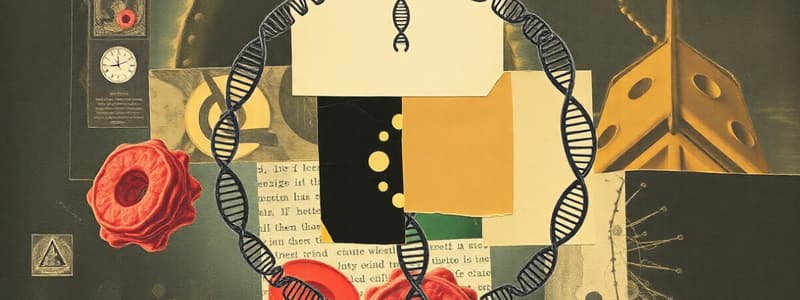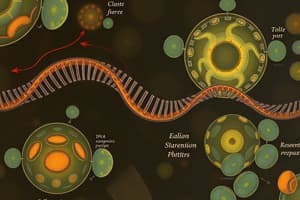Podcast
Questions and Answers
What role do cyclins play in the cell cycle?
What role do cyclins play in the cell cycle?
- They activate cyclin-dependent kinases. (correct)
- They repair DNA damage.
- They induce apoptosis.
- They inhibit CDK activity.
CDK inhibitors promote cell cycle progression.
CDK inhibitors promote cell cycle progression.
False (B)
Name one example of a tumor suppressor protein.
Name one example of a tumor suppressor protein.
p53
The presence of DNA damage triggers __________ pathways that can halt the cell cycle.
The presence of DNA damage triggers __________ pathways that can halt the cell cycle.
Match the following factors with their roles in the cell cycle:
Match the following factors with their roles in the cell cycle:
Which of the following is a major cell cycle checkpoint?
Which of the following is a major cell cycle checkpoint?
Mitogens are a type of nutrient that stimulates cell division.
Mitogens are a type of nutrient that stimulates cell division.
What is the function of CDKs in the cell cycle?
What is the function of CDKs in the cell cycle?
Which of the following is a mitotic inhibitor?
Which of the following is a mitotic inhibitor?
Cyclophosphamide is an antimetabolite that interferes with DNA synthesis.
Cyclophosphamide is an antimetabolite that interferes with DNA synthesis.
Name one drug that inhibits CDK 4 and CDK 6.
Name one drug that inhibits CDK 4 and CDK 6.
__________ is a drug that adds alkyl groups to DNA.
__________ is a drug that adds alkyl groups to DNA.
What is the primary mechanism of action for topoisomerase inhibitors?
What is the primary mechanism of action for topoisomerase inhibitors?
Match the following cancer drugs with their mechanisms:
Match the following cancer drugs with their mechanisms:
Bleomycin is known for its ability to stabilize DNA and prevent breaks.
Bleomycin is known for its ability to stabilize DNA and prevent breaks.
Why are CDK 4 and CDK 6 commonly targeted in cancer treatment?
Why are CDK 4 and CDK 6 commonly targeted in cancer treatment?
What initiates the transcription of genes necessary for S phase entry during the G1 phase?
What initiates the transcription of genes necessary for S phase entry during the G1 phase?
The Cyclin E - CDK 2 complex is important for stopping DNA replication before entering S phase.
The Cyclin E - CDK 2 complex is important for stopping DNA replication before entering S phase.
What is the role of Cyclin B - CDK 1 complex during M phase?
What is the role of Cyclin B - CDK 1 complex during M phase?
Cyclin A pairs with CDK ______ to prepare the cell for mitosis.
Cyclin A pairs with CDK ______ to prepare the cell for mitosis.
Match the following cyclin-CDK complexes with their primary function:
Match the following cyclin-CDK complexes with their primary function:
Which cyclin accumulates as the cell approaches the G1/S transition?
Which cyclin accumulates as the cell approaches the G1/S transition?
Phosphorylation events regulate the activation of the Cyclin B - CDK 1 complex.
Phosphorylation events regulate the activation of the Cyclin B - CDK 1 complex.
What does the Cyclin A - CDK 2 complex do during the S phase?
What does the Cyclin A - CDK 2 complex do during the S phase?
What is the main role of BRCA 1 and BRCA 2 genes?
What is the main role of BRCA 1 and BRCA 2 genes?
Mutations in BRCA 1 and BRCA 2 can lead to genomic stability.
Mutations in BRCA 1 and BRCA 2 can lead to genomic stability.
Name two primary cancers associated with BRCA 1/2 mutations.
Name two primary cancers associated with BRCA 1/2 mutations.
The failure of cell cycle checkpoints due to BRCA 1/2 mutations contributes to __________.
The failure of cell cycle checkpoints due to BRCA 1/2 mutations contributes to __________.
Match the checkpoint phase with its key role regarding BRCA 1/2:
Match the checkpoint phase with its key role regarding BRCA 1/2:
What is a major side effect of certain cancer treatments associated with BRCA 1/2 mutations?
What is a major side effect of certain cancer treatments associated with BRCA 1/2 mutations?
PARP inhibitors target the enzymes involved in the repair of single-strand breaks in DNA.
PARP inhibitors target the enzymes involved in the repair of single-strand breaks in DNA.
What class of drugs is used in clinical settings for individuals with BRCA 1/2 mutations?
What class of drugs is used in clinical settings for individuals with BRCA 1/2 mutations?
Flashcards are hidden until you start studying
Study Notes
The Cell Cycle: Stages and Regulation
- G1 Phase: Cell growth and preparation for DNA replication
- Cyclin D-CDK 4/6 complexes initiate the G1 phase, promoting the synthesis of proteins needed for S phase.
- Phosphorylation of the retinoblastoma protein (Rb) releases E2F transcription factors, allowing S phase entry.
- G1/S Checkpoint: Ensures the cell is ready for DNA replication
- Cyclin E-CDK 2 complex further phosphorylates Rb, bolstering E2F release and initiating DNA replication.
- This complex also activates proteins involved in pre-replication complex formation.
- S-Phase: DNA replication
- Cyclin A-CDK 2 complex drives DNA synthesis, ensuring accurate and efficient replication.
- This complex prevents re-replication by inhibiting pre-replication complex formation.
- G2 Phase: Cell preparation for mitosis
- Cyclin A-CDK 1 complex triggers chromatin condensation and activates mitotic proteins.
- G2/M Checkpoint: Ensures DNA is properly replicated and ready for mitosis
- Cyclin B-CDK 1 complex (Maturing Promoting Factor, MPF) controls the transition to M phase.
- MPF regulates critical events like nuclear envelope breakdown, chromosome condensation, spindle formation, and chromosome alignment.
- CDK 1 activation relies on precise phosphorylation events.
- M-Phase: Cell division
- Cyclin B-CDK 1 complex remains active during prophase, metaphase, and anaphase, driving mitotic events.
- Degradation of Cyclin B by the anaphase-promoting complex/cyclosome (APC/C) enables the completion of mitosis and cytokinesis.
Factors that Drive Cell Cycle Progression
- Cyclins: Regulate cell cycle progression by activating cyclin-dependent kinases (CDKs). Their levels fluctuate throughout the cycle.
- Cyclin-Dependent Kinases (CDKs): Enzymes activated by cyclins to phosphorylate target proteins.
- CDK Inhibitors (CKIs): Serve as checkpoints, halting the cell cycle in response to DNA damage or stress.
- Growth Factors: Promote cell division and survival by initiating signaling pathways that regulate cell cycle progression.
- Tumor Suppressor Proteins: Act as negative regulators to suppress uncontrolled cell proliferation. Examples include p53 and Rb.
- Oncogenes: Mutated or overexpressed genes that drive uncontrolled cell proliferation. Examples include genes encoding growth factor receptors and signaling proteins like Ras.
- DNA Damage & Repair Mechanisms: Cells activate checkpoint pathways to arrest the cell cycle and facilitate DNA repair.
- Cell Cycle Checkpoints: Control mechanisms that ensure proper progression only when conditions are favorable.
- Mitogens: Induce cell division by stimulating the transition from quiescence (G0) to G1 phase.
- Nutrient Availability: Adequate nutrients and energy are crucial for cell growth and division, monitored by signaling pathways.
Drugs that Interfere with the Cell Cycle
- Antimetabolites: Mimic natural substances, interfering with DNA and RNA synthesis.
- Methotrexate: Inhibits nucleotide synthesis.
- 5-fluorouracil (5-FU): Inhibits DNA synthesis.
- Cytarabine: Inhibits DNA polymerase.
- Mitotic Inhibitors: Disrupt microtubule function, inhibiting mitosis.
- Paclitaxel (Taxol): Stabilizes microtubules.
- Vincristine and Vinblastine: Inhibit microtubule assembly.
- Topoisomerase Inhibitors: Interfere with the enzymes that control changes in DNA structure for replication.
- Doxorubicin: Inhibits topoisomerase II.
- Etoposide: Inhibits topoisomerase II.
- Alkylating Agents: Add alkyl groups to DNA, leading to damage and apoptosis.
- Cyclophosphamide: Cross-links DNA strands.
- Cisplatin: Forms DNA adducts, causing cross-linking.
- Antitumor Antibiotics: Intercalate into DNA, disrupting transcription and replication.
- Doxorubicin (Adriamycin): Intercalates into DNA.
- Bleomycin: Causes DNA breaks.
- CDK Inhibitors: Inhibit cyclin-dependent kinases, crucial for cell cycle progression.
- Palbociclib: Inhibits CDK 4 & 6.
- Ribociclib: Inhibits CDK 4/6.
- Proteasome Inhibitors: Inhibit the proteasome, accumulating damaged proteins and causing cell cycle arrest.
- Bortezomib: Inhibits the 26s proteasome.
Targeting CDK 4/6 in Cancer Therapy
- Inhibiting CDK 4/6 is a strategy for controlling cell proliferation and potentially halting tumor growth.
- Inhibitors like Palbociclib, Ribociclib, and Abernacyclic are used in hormone-driven breast cancer.
Side Effects of Cell Cycle Inhibitors
- Bone marrow suppression: Reduces blood cell production.
- Diarrhea:Due to continuous cell division in the gut.
BRCA 1/2 and Checkpoint Mutations:
- BRCA 1 and BRCA 2 participate in DNA repair (especially homologous recombination) and cell cycle regulation.
- Mutations in these genes disrupt DNA repair and contribute to cancer development, particularly breast and ovarian cancers.
BRCA 1/2 and Cell Cycle Checkpoints:
- G1/S Checkpoint: BRCA 1 plays a role in repairing double-strand DNA breaks. Mutations may bypass this checkpoint.
- G2/M Checkpoint: Both BRCA 1/2 are crucial for ensuring DNA damage repair before mitosis. Mutations can impair this checkpoint.
Impact of BRCA 1/2 Mutations on Checkpoints:
- Loss of function in BRCA 1/2 proteins leads to impaired DNA repair and checkpoint failure, allowing cells with DNA damage to progress through the cell cycle.
Genomic Instability:
- The failure of checkpoints due to BRCA 1/2 mutations leads to genomic instability, a hallmark of cancer, promoting tumorigenesis.
Clinical Implications:
- BRCA 1/2 mutations increase the risk of developing cancers, especially breast and ovarian cancers.
- Individuals with these mutations are candidates for targeted therapies like PARP inhibitors.
PARP Inhibitors:
- Target enzymes involved in single-strand break (SSB) DNA repair.
- Exploit defective DNA repair mechanisms in cells with BRCA mutations, leading to cell death.
Summary:
- The cell cycle is tightly regulated to ensure proper growth and division.
- Understanding cell cycle regulation is crucial for developing cancer therapies that target specific points in this process.
Studying That Suits You
Use AI to generate personalized quizzes and flashcards to suit your learning preferences.




